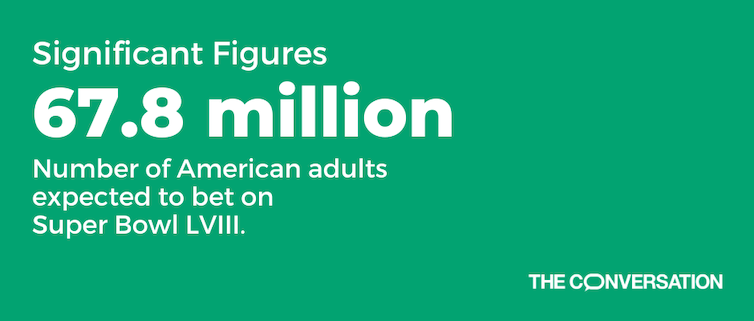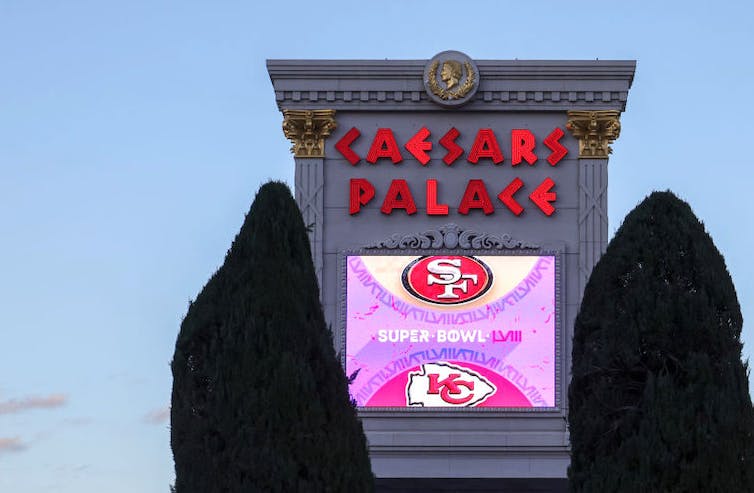The Super Bowl gets the Vegas treatment, with 1 in 4 American adults expected to gamble on the big game

Billions of dollars are being bet on the matchup between the San Francisco 49ers and Kansas City Chiefs. Ethan Miller/Getty Images

CC BY-ND
A record 67.8 million American adults are expected to bet US$23.1 billion on Super Bowl LVIII, according to a new survey conducted by Morning Consult for the American Gaming Association. The estimated number of bettors has increased 35% from the previous Super Bowl, while the total amount being bet is estimated to have shot up from $16 billion in 2023.
Both figures would represent records – fitting for a Super Bowl held in Las Vegas, the gambling capital of the U.S.
For the NFL, partnering with sportsbooks has been a boon for business. The relationship appears to be a natural one: Though sports betting was illegal in most of the country until 2018, it’s always been a part of sports fandom.
But as a sports media scholar, I find the league’s embrace of gambling so striking because for most of its history, the NFL had pushed the government for stricter regulations, not more lenient ones.
Particularly in its early days, the NFL wanted to avoid the stain of bookies, bets, fixed games and the gambling crises that had befallen other professional sports leagues.
Staunch opposition
In 1963, just as the NFL was starting to become profitable thanks to broadcasting deals, a gambling scandal threatened the league’s growing popularity.
Commissioner Pete Rozelle suspended two of the league’s stars, the Green Bay Packers’ Paul Hornung and Alex Karras of the Detroit Lions, for a full season after both players admitted to placing bets on NFL games.
“This sport has grown so quickly and gained so much of the approval of the American public,” Rozelle told Sports Illustrated at the time, “that the only way it can be hurt is through gambling.”
But football and gambling eventually resumed their delicate dance. In 1976, CBS hired bookmaker and newspaper columnist James “Jimmy the Greek” Snyder to join the cast of its flagship pregame program, “The NFL Today.” CBS Sports president Bob Wussler knew that millions of viewers wanted to know the betting lines for upcoming games. It was Snyder’s job to communicate them.
The NFL’s leadership, however, remained adamantly opposed to its broadcasting partners explicitly encouraging gambling. So Snyder communicated the lines by predicting the final score, thereby allowing careful listeners to learn a point spread. The routine lasted until 1988, when Snyder suggested that slavery had made Black players better athletes. He was fired the next day.
In 1992, the NFL and other major sports leagues lobbied for the Professional and Amateur Sports Protection Act, which would severely restrict sports gambling, allowing it only in Nevada, Oregon, Delaware and Montana. Rozelle’s successor, Paul Tagliabue, testified in favor of the bill, telling Congress: “We do not want our games to be used as bait to sell gambling. We have to make it clear to the athletes, the fans and the public, gambling is not a part of sport, period.” The measure passed.
In 2017, current NFL commissioner Roger Goodell reiterated the league’s stance. Speaking in the wake of the owners’ decision to allow the Oakland Raiders to relocate to Las Vegas, he insisted: “We still strongly oppose … legalized sports gambling. The integrity of our game is No. 1. We will not compromise on that.”
More money, more problems?
Everything changed a year later, when the Supreme Court declared the Professional and Amateur Sports Protection Act unconstitutional, which left the decision to allow sports gambling to the states. Since then, more than 30 states have legalized sports gambling.
Despite its historical opposition to sports gambling, the NFL moved quickly to take advantage of the new legal landscape.
In 2021, the league announced seven companies, including BetMGM, Draft Kings and Caesars, as the league’s official gambling partners. Two years later, ESPN, one of the league’s major partners – and one in which the league may soon buy a stake – announced the formation of ESPN BET, a sportsbook partnership with Penn Entertainment. ESPN immediately began promoting its new venture on its television and web platforms.

Gambling and football have become two peas in a pod.
Ethan Miller/Getty Images
By embracing sports gambling, the NFL has unleashed new profit streams. Even casual fans can’t miss the surge in gambling advertisements that now air during the games, all of which buttress the value of media rights. Meanwhile, the NFL’s official sportsbook partners will fork over more than $1 billion to the league over the course of the five-year contract.
But this infusion of extra cash comes with a substantial social cost. Gambling addictions are at an all-time high, likely spurred by the ease with which people can place bets from their phones. Young men seem to be especially vulnerable.
Ten NFL players have been suspended for gambling on sports since 2022. Several former athletes have come forward to share stories of their struggles with sports betting.
Nonetheless, the league continues to promote gambling sites to its fan base. The gambling prohibitions for players have not substantially changed, but the environment in which they work and live has made the temptation far more difficult to avoid.
Goodell has cast the league’s partnerships with sportsbooks as a no-brainer for the bottom line: “We have to be in that space,” he plainly stated in a September 2023 interview.
Meanwhile, the potential costs – for the league and for its fans – are a bit harder to see, at least right away. But to anti-gambling advocates, they’re no less pernicious.
![]()
Thomas Oates does not work for, consult, own shares in or receive funding from any company or organization that would benefit from this article, and has disclosed no relevant affiliations beyond their academic appointment.







